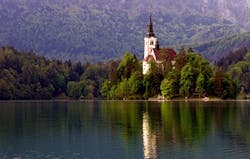Constitutional right to “liquid gold” locks out private water sector in Slovenia
LJUVLJANA, Slovenia – An amendment to Slovenia’s constitution giving citizens access to water as a fundamental right will see water services delivered without private sector involvement.
An article has been added to the European Union’s (EU) constitution citing that “everyone has the right to drinkable water”.
Out of the Slovenia’s 90-seat parliament, a total of 64 members of Slovenia’s National Assembly voted in favour of the move, with none voting against.
Text proposed by the commission stated that drinking water “should not be treated as a commodity” and that water provision should be a “non-profit public service”.
The amendment will require that water for drinking and household use is provided purely by the public sector.
As part of the Right2Water campaign in Europe initiated by the European Public Service Union (EPSU), 55,000 Slovenians signed a petition in favour of including the right to water in the constitution.
The Guardian reported that centre-left prime minister, Miro Cerar, urged lawmakers to pass the bill, stating the Slovenia should “protect water – the 21st century’s liquid gold – at the highest legal level”.
One of the most water-rich countries in Europe, groundwater supplies approximately 97% of drinking water in the country.
NGO Amnesty International said the constitutional amendment must be fully implemented to benefit the lives of Slovenia’s Roma communities denied access to water.
Estimates suggest there’s as many as 12,000 Roma people living in Slovenia, many in isolated settlements or slums in rural areas.
Fotis Filippou, Amnesty International's deputy Europe director, said: “Enshrining access to drinking water as a constitutional human right is an important legal step forward for Slovenia, but Roma communities need more than legal changes. Action is now needed to ensure the changes flow down to all those without water and sanitation.
“It is shocking that in a highly developed country like Slovenia, where almost 100% of the population have access to safe water, some Roma communities struggle to collect even small amounts of water to drink, cook and bathe themselves and their families.”
###
Read more
The EU’s water architect: And how he’ll deliver Europe’s Water Blueprint
EU Water Framework Directive – Eastern European countries lack evidence
About the Author

Tom Freyberg
Tom Freyberg is an experienced environmental journalist, having worked across a variety of business-to-business titles. Since joining Pennwell in 2010, he has been influential in developing international partnerships for the water brand and has overseen digital developments, including 360 degree video case studies. He has interviewed high level figures, including NYSE CEO’s and Environmental Ministers. A known figure in the global water industry, Tom has chaired and spoken at conferences around the world, from Helsinki, to London and Singapore. An English graduate from Exeter University, Tom completed his PMA journalism training in London.

